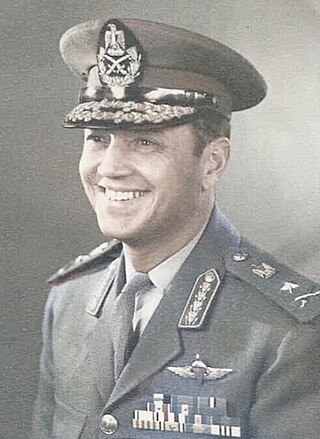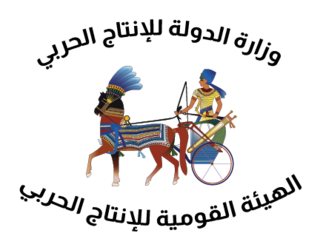Related Research Articles

The Egyptian Armed Forces are the military forces of the Arab Republic of Egypt. They consist of the Egyptian Army, Egyptian Navy, Egyptian Air Force and Egyptian Air Defense Forces.

The Kuwait Armed Forces are the military forces of the State of Kuwait. They consist of the Kuwait Air Force, the Kuwait Army, the Kuwait Navy & the Kuwait National Guard. The governing bodies are the Kuwait Ministry of Defense, the Kuwait Ministry of Interior, and the Kuwait Fire Service Directorate. The Emir of Kuwait is the commander-in-chief of all defense forces while the Crown Prince is the deputy commander.

The Yemeni Armed Forces are the military forces of the Republic of Yemen. They include the Yemeni Army, Yemeni Navy and the Yemeni Air Force. The capital of the country, Sana’a is where the military is headquartered. Per the constitution of Yemen, the President of Yemen serves as the commander-in-chief.

The Free Officers were a group of revolutionary Egyptian nationalist officers in the Egyptian Armed Forces and Sudanese Armed Forces that instigated the Egyptian Revolution of 1952. Initially started as a small rebellion military cell under Abdel Moneim Abdel Raouf, which included Gamal Abdel Nasser, Hussein Hamouda, Khaled Mohieddin, Kamal el-Din Hussein, Salah Nasr, Abdel Hakim Amer, and Saad Tawfik, it operated as a clandestine movement of junior officers who were veterans of the Palestine War of 1948-1949 as well as earlier nationalist uprisings in Egypt in the 1940s. The nationally respected war hero Mohamed Naguib joined the Free Officers in 1949. Naguib's hero status, and influence within the army, granted the movement credibility, both within the military and the public at large. He became the official leader of the Free Officers during the turmoil leading up the revolution that toppled King Farouk in 1952.
The Egyptian Military College is the oldest and most prominent military academy in Egypt. One of the colleges of the Egyptian Military Academy Traditionally, graduates of the Military Academy are commissioned as officers in the Egyptian Army. However, they may serve in other branches and commands of the Egyptian military establishment.
The Egyptian Air College One of the colleges of the Egyptian Military Academy,, is a college in Bilbeis, Sharqia Governorate, Egypt, tasked with training officer candidates for the Egyptian Air Force. Established in 1951, the Egyptian Air College is one of seven military academies administered by the various branches of the Egyptian Armed Forces. The current director of the Egyptian Air Academy is Air Vice-Marshal Abd-El Moneam Hassan Shouman.

Saad el-Din Mohamed el-Husseiny el-Shazly was an Egyptian military commander. He was Egypt's chief of staff during the October War. He is credited with the equipping and preparation of the Egyptian Armed Forces in the years prior to the successful capture of the Israeli Bar-Lev line at the start of the Yom Kippur War. He was dismissed from his post on 13 December 1973.

The Egyptian Republican Guard is a Division level command within the Egyptian Army, designed to be an armored division with the main responsibilities of defending the President of the Republic as well as the major presidential and strategic institutions, including the Presidential Palaces, Command centers, and presidential airports. It is one of the largest Divisional commands in Egypt with a heavy emphasis on Armoured and Mechanized warfare. It is the most senior Corps in the Egyptian Army. The Republican Guard is the only division in the Egyptian Armed Forces that receives commands only from its commander and the president, rather than the Supreme Council of the Armed Forces led by the minister of defense.

Abdel Hamid Sarraj was a Syrian Army officer and politician. When the union between Egypt and Syria was declared, Sarraj, a staunch Arab nationalist and supporter of Egyptian president Gamal Abdel Nasser, played a key role in the leadership of the Syrian region of the UAR. Due to the repression of the UAR towards the Syrian communists he was nicknamed Sultan Abdel Hamid referring to the Ottoman sultan Abdul Hamid II.

The Supreme Council of the Armed Forces is a statutory body of between 20 and 25 senior officers of the Egyptian Armed Forces, and is headed by Field Marshal Abdul Fatah al-Sisi and Lieutenant General Mohamed Ahmed Zaki. The council is convened only in cases of war or great internal emergencies. As a consequence of the Egyptian Revolution of 2011, SCAF assumed power to govern Egypt from departing President Hosni Mubarak on 11 February 2011, and relinquished power on 30 June 2012 upon the start of Mohamed Morsi's term as president. The Council has met regularly in times of national emergencies. During the course of the 2011 revolution, the Supreme Council of the Armed Forces met first on 9 February 2011 under the chairmanship of Egyptian president, Hosni Mubarak. The Council met for the first time without the chairmanship of the president on the following day, 10 February, and issued their first press statement which signaled that the council was about to assume power which they did the following day after Mubarak's resignation. The military junta was headed by Field Marshal Mohamed Hussein Tantawi who served as the Minister of Defense under Mubarak, and included the service heads and other senior commanders of the Egyptian Armed Forces, namely Lt. Gen. Sami Hafez Anan, Armed Forces Chief of Staff; Air Marshal Reda Mahmoud Hafez Mohamed, Air Force commander; Lt. Gen. Abd El Aziz Seif-Eldeen, Commander of Air Defense; and Vice Admiral Mohab Mamish, Navy Commander in Chief.

Mahmoud Ibrahim Mahmoud Hegazy is an Egyptian general who was the Chief of Staff of the Egyptian Armed Forces from 2014 to 2017. Hegazy graduated from the Egyptian Military Academy in 1977, and served as the Chief of the Egyptian Military intelligence before his appointment as Chief of Staff by the president of Egypt, Abdel Fattah el-Sisi. He is related to Sisi through the marriage of their respective children. Mahmoud Hegazy was replaced in 2017 by Mohammed Farid Hegazy in a shakeup of high level security personnel. No reason was given for the changes, but since 2013, Egypt has been fighting an ongoing Islamist insurgency that has killed of hundreds of policemen and soldiers. A week before the dismissal, sixteen policemen were killed during a police operation in the western desert of Giza province, and two high level security personnel for Giza were also dismissed. Hegazy was given a position of security advisor to the president. He is a member of the Supreme Council of the Armed Forces.

The Chief of the General Staff of the Egyptian Armed Forces is second in command after the Minister of Defense and the President. He usually holds the second highest military rank. Commanders of the Navy, Air Force and Air Defense Forces are under his command.
The Egyptian Ministry of Military Production is responsible for managing the development and operation of military factories in the Egyptian Republic and now chaired by Major General Mahammad Salah el-Din Mostafa, who took over the ministry within the ministry of Mostafa Madbouly in 14 August 2022.
The Military Intelligence and Reconnaissance Administration, is the agency of the Egyptian Ministry of Defense responsible for military intelligence. It is one of the three Egyptian intelligence services, along with the General Intelligence Service (GIS) and National Security Agency.
Armed Forces Engineering Authority is one of the Egyptian Ministry of Defense agencies. The Armed Forces Engineering Authority, through its affiliated departments, carries out many specialized tasks and engineering insurance operations for the main branches of the Armed Forces. It also contributes to the comprehensive development process of the state. Starting from clearing the land of war remnants to establish development and urban projects, establishing networks of free roads, bridges and airports in various governorates of Egypt, establishing many water desalination plants and drilling wells, extending water lines to new cities and urban communities, implementing surveying work and issuing maps and encyclopedias to assist civil agencies. In implementing mega projects, as well as participating in healthy cultural and social development projects by establishing and developing schools, hospitals, health units, and cultural development centers in all parts of Egypt, establishing agricultural and production projects, manufacturing raw materials and construction materials used in the projects, and establishing and developing stadiums, stadiums, and sports arenas to hold local and international tournaments. It also assists the civil sector in overcoming the effects resulting from natural and industrial disasters, carrying out rescue, rescue and rapid intervention operations using the latest devices and various equipment, capabilities and capabilities, sheltering those affected, removing rubble and assisting in establishing health isolation camps.
Armed Forces Arming Authority is one of the Egyptian Ministry of Defense agencies.
Mahmoud el-Sisi is the deputy head of the Egyptian General Intelligence Directorate and the son of Egyptian President Abdel Fattah el-Sisi.

The November 1959coup attempt aimed at overthrowing Sudan's ruler, Lieutenant General Ibrahim Abboud, but was thwarted. The military court sentenced officers involved, with some receiving the death penalty, marking Sudan's first post-independence execution.

The National Authority for Military Production or National Organisation for Military Production (Egyptian Arabic: الهيئة القومية للإنتاج الحربي) is an Egyptian body with a legal personality affiliated with the Ministry of Military Production. It was established pursuant to Law No. 6 of 1984 to become one of the pillars of the military industry in Egypt through its supervision of military factories. It was previously called the (Egyptian General Organisation for Military Factories and Aircraft Industry) before changing to its current name.
The Abu Zaabal Specialized Industries Company or Military Factory 300 is an Egyptian government joint-stock company, one of the companies of the National Authority for Military Production affiliated with the Ministry of Military Production, established by Resolution of the Minister of Military Production No. 37 of 2016, located in the Abu Zaabal area in Qalyubia Governorate, on an area of 371 acres, works in the field of producing small and medium weapons and ammunition of various types.
References
- 1 2 اللواء كمال وفائي رئيس هيئة التسليح: تطوير القوات المسلحة مستمر.. ونحافظ على السلام بامتلاك القوة. Al-Ahram (07-12-2022)
- ↑ الكليات العسكرية - نبذة تاريخية archived copy 28 July 2017 on Wayback Machine website.
- ↑ منشورات قانونية - إنشاء المعهد الفني للقوات المسلحة archived copy 19 May 2020 on Wayback Machine website
- ↑ منشورات قانونية - إصدار قانون إنشاء مدارس فنية أساسية عسكرية archived copy 19 May 2020 on Wayback Machine website